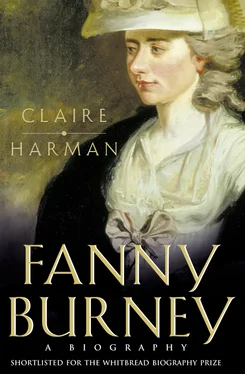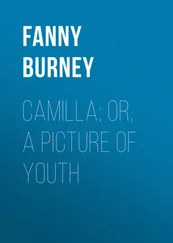Their next notable visitor was one of the most famous singers of the day, the Italian soprano Lucrezia Agujari, known rather blatantly as ‘La Bastardina’. Mozart had met her in 1768 and marvelled at her astonishingly high range: she had, in his presence, reached three octaves above middle C – a barely credible achievement. She was virtuosa di camera to the court of the Duke of Parma, whose master of music, Giuseppe Colla, ‘a Tall, thin, spirited Italian, full of fire, & not wanting in Grimace’, 59 was her constant companion. Susan Burney had got the impression – not unreasonably – that the couple were married, and that La Bastardina retained her maiden name for professional purposes. This led Hetty to cause the singer some consternation by enquiring if she had any children: ‘Moi!’ she exclaimed disingenuously, ‘je ne suis pas mariée, moi!’ 60
The Burneys were of course all craving to hear Agujari sing, but Signor Colla explained that a slight sore throat prevented it. ‘The singer is really a slave to her voice’, Fanny noted in her journal; ‘she fears the least Breath of air – she is equally apprehensive of Any heat – she seems to have a perpetual anxiety lest she should take Cold; & I do believe she neither Eats, Drinks, sleeps or Talks, without considering in what manner she may perform those vulgar duties of Life so as to be the most beneficial to her Voice.’ Agujari was contracted at huge cost to sing at the Pantheon on Oxford Road (a new venue for concerts and assemblies that was proving immensely popular and in which Charles Burney had shares), and though she promised to return and sing for the Burneys at some later date, the possibility seemed remote. Months passed and they heard nothing of her, only jokes based on the story that she had been mauled by a pig when young and had had her side repaired with a silver plate. Lord Sandwich, First Lord of the Admiralty at the time, showed Charles Burney a satirical song he had written on the subject and wanted to have set to music. It was a dialogue between Agujari and the pig, ‘beginning Caro Mio Porco – the Pig answers by a Grunt; – & it Ends by his exclaiming ah che bel mangiare !’ 61 It is interesting to note that although the parody of her father’s book had struck Fanny as scandalous, she was quite happy to join in and pass on jokes about Agujari’s ‘silver side’. It presented ‘too fair a subject for Ridicule to have been suffered to pass untouched’.
It wasn’t until June that Agujari did sing for the Burneys, and then all jokes about her person and criticism of her affectations were forgotten. ‘We wished for you! I cannot tell you how much we wished for you!’ Fanny wrote ecstatically to Crisp:
I could compare her to nothing I ever heard but only to what I have heard of – Your Carestino – Farinelli – Senesino – alone are worthy to be ranked with the Bastardini. Such a powerful voice! – so astonishing a Compass – reaching from C in the middle of the Harpsichord, to 2 notes above the Harpsichord! Every note so clear, so full – so charming! Then her shake – so plump – so true, so open! it is [as] strong & distinct as Mr Burney’s upon the Harpsichord. 62
Agujari certainly did not stint her hosts. She stayed for five hours, singing ‘almost all the Time’, arias, plain chant, recitative: ‘whether she most astonished, or most delighted us, I cannot say – but she is really a sublime singer’. There was no more talk of their exotic visitor being ‘conceitedly incurious’ about her rivals: ‘her Talents are so very superior that she cannot chuse but hold all other performers cheap’. 63 The generous free recital, the sublime voice, the plump shake had all done their work. Fanny and her sisters became Agujari’s besotted devotees.
In his Surrey retreat, Crisp hung on these bulletins, especially the accounts of musical evenings. On one memorable occasion in 1773 recorded by Fanny, the party consisted of the violinist Celestini, the singer Millico and the composer Antonio Sacchini, ‘the first men of their Profession in the World’. 64 Fanny could describe in detail evenings out, say at the opera, where they had gone to hear Agujari’s rival Gabrielli, and reproduce the long discussions about the performances afterwards, with what seems to be remarkable accuracy. The guests at one of the Doctor’s musical evenings that summer and autumn included Viscount Barrington, then Secretary at War, the Dutch Ambassador and Lord Sandwich, whom Charles Burney was no doubt trying to cultivate on James’s behalf. This was exciting company for the Burney girls, and the fact that Fanny relished these evenings shows that her shyness was less potent than her curiosity. Some of their guests were outlandish, such as Prince Orloff, the lover of Catherine the Great, who arrived at St Martin’s Street late on the appointed evening and squatted on a bench next to Susan, almost squashing her. His appearances in London had been the subject of much gossip, and here he was, dwarfing his hosts and dripping with diamonds, a portrait of the Empress indiscreetly flashing on his breast. Not that it was easy to see it – when the Burney girls were shown it the glare of the surrounding jewels was almost blinding; ‘one of them, I am sure, was as big as a Nutmeg at least ’ Fanny wrote. 65
Fanny’s early diaries describe a life of seemingly uninterrupted gaiety in the company of her loving sisters, adored father and some of the greatest artists of the day. The ‘ abominably handsome’ Garrick continued to be a frequent visitor, loved by the whole family; on one occasion he picked Charlotte out of her bed and ran with her as far as the corner of the street. When he threatened to abduct the other girls ‘we all longed to say, Pray do! ’ 66 But as the editors of Fanny’s diaries have pointed out, the consistently cheerful portrait of life in St Martin’s Street is deceptive, since most of the material relating to Fanny’s stepmother was destroyed. From other sources, such as a letter to Fanny from Maria Rishton in September 1776, a different picture emerges:
I knew you could never live all together or be a happy society but still bad as things used to be when I was amongst you they were meer children falling out to what they seem to be now … You know the force of her expression. And indeed I believe she writes from the heart when she says she is the most miserable woman that breathes. 67
When Mrs Burney was nervous and dictatorial, the girls responded with outward deference and private ill-will. She was perceived by them as grossly insensitive; perversely, this led them to treat her with gross insensitivity, almost as if they were testing her, trying to prove their worst apprehensions. A cabal formed against ‘the Lady’, and to his shame ‘Daddy’ Crisp joined it gleefully, going so far as to be ‘excessively impudent’ to her face and satirical behind her back, ‘ taking her off! – putting his hands behind him, & kicking his heels about!’ 68
The portrait of Mrs Ireton in Fanny Burney’s last novel, The Wanderer , seems to draw on many of the second Mrs Burney’s supposed attributes (as well as those of Fanny’s later bête noire at Court, Mrs Schwellenberg, whom she called Mama’s double). The heroine of The Wanderer , Juliet, whom Mrs Ireton oppresses from sheer bloody-mindedness and sadism, is forced to act as ‘humble companion’, a symbolic representation of Fanny’s subordination to her stepmother. An explanation for Elizabeth Burney’s ‘love of tyranny’ is suggested in the story by Mrs Ireton’s brother-in-law, who knew the old harpy in youth as ‘eminently fair, gay, and charming!’ 69 Perhaps the inextinguishable spleen of the Burney ‘Family Scourge’ was, like Mrs Ireton’s, a kind of shock reaction to the withdrawal of sexual attention:
Читать дальше












